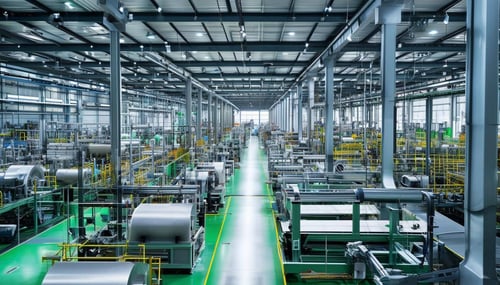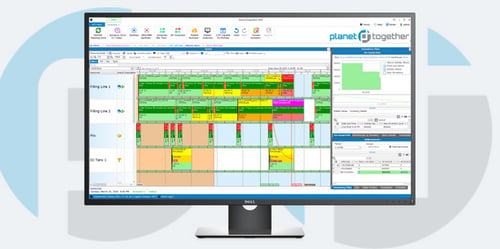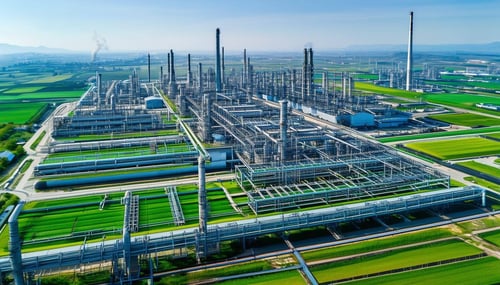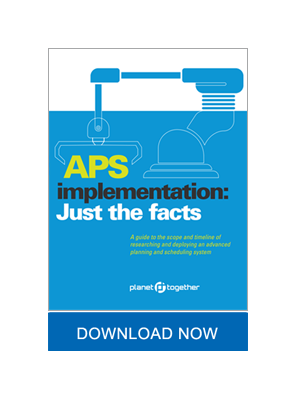Sustainability and Green Manufacturing: The Role of Production Scheduling in Industrial Facilities
Sustainability is no longer a secondary consideration but a fundamental pillar of business strategy. Companies across the manufacturing sector are recognizing the need to adopt green manufacturing practices, driven by regulatory pressures, customer expectations, and the undeniable financial benefits of energy efficiency and waste reduction.
For production schedulers in industrial manufacturing facilities, this shift presents both challenges and opportunities. Effective scheduling plays a crucial role in optimizing resource use, reducing waste, and aligning production processes with sustainability goals. When integrated with advanced planning tools such as PlanetTogether and enterprise systems like SAP, Oracle, Microsoft, Kinaxis, or Aveva, scheduling can become a powerful enabler of green manufacturing initiatives.

The Sustainability Imperative in Industrial Manufacturing
Industrial manufacturers operate within energy-intensive environments, where inefficiencies can lead to excessive resource consumption, high emissions, and increased operational costs. Sustainability initiatives in manufacturing typically focus on:
Reducing energy consumption by optimizing equipment utilization.
Minimizing material waste through better planning and process efficiency.
Enhancing supply chain sustainability by optimizing logistics and reducing transportation emissions.
Complying with environmental regulations while maintaining profitability and productivity.
For production schedulers, these priorities must be woven into the daily task of balancing demand, capacity, and cost constraints.

The Role of Production Scheduling in Green Manufacturing
Traditionally, production scheduling focused on meeting customer demands while minimizing downtime and reducing operational costs. However, in the era of sustainability, schedulers must now also factor in:
Energy efficiency: Aligning high-energy processes with off-peak hours to leverage lower energy costs and reduce strain on the grid.
Equipment utilization: Grouping similar production runs to minimize changeovers and reduce resource waste.
Waste reduction: Optimizing material usage and reducing scrap rates through smarter planning.
Carbon footprint: Scheduling processes that lower emissions by coordinating with eco-friendly suppliers and optimizing logistics.
To achieve these sustainability goals, manufacturers need to go beyond traditional scheduling methods and leverage advanced digital tools that integrate with enterprise-wide systems.

Integrating PlanetTogether with SAP, Oracle, Microsoft, Kinaxis, and Aveva for Sustainable Scheduling
Modern production scheduling tools like PlanetTogether are designed to optimize manufacturing operations with sustainability in mind. When integrated with enterprise solutions such as SAP, Oracle, Microsoft, Kinaxis, and Aveva, the benefits are amplified, enabling real-time data exchange and more informed decision-making.
Energy-Efficient Scheduling
PlanetTogether's integration with SAP or Oracle allows production schedulers to access real-time energy consumption data. By analyzing this data, they can:
Schedule high-energy-consuming tasks during off-peak hours.
Shift production loads to machinery that operates more efficiently.
Monitor and control energy expenditures across the facility.
Minimizing Material Waste
By integrating PlanetTogether with Microsoft or Kinaxis, schedulers can leverage real-time material availability data to:
Reduce overproduction by aligning production with demand forecasts.
Optimize batch sizes to minimize scrap and leftover raw materials.
Implement Just-in-Time (JIT) production to reduce inventory waste.
Reducing Carbon Footprint in Logistics
With PlanetTogether connected to Aveva or Kinaxis, production scheduling can incorporate logistics optimization to:
Reduce unnecessary transportation emissions by consolidating shipments.
Improve routing to lower fuel consumption and transport time.
Coordinate production with supplier sustainability initiatives.
Real-Time Monitoring and Compliance
PlanetTogether’s integration with SAP or Oracle allows for automatic tracking of emissions, waste, and energy usage, ensuring compliance with sustainability regulations. This provides production schedulers with:
Instant insights into environmental performance metrics.
Alerts when sustainability targets are at risk of being missed.
Automated reporting to ensure regulatory adherence.
The Financial and Operational Benefits of Sustainable Scheduling
Beyond environmental benefits, sustainable production scheduling yields financial and operational gains:
Cost savings: Lower energy consumption and material waste directly translate to reduced operational expenses.
Improved brand reputation: Consumers and partners are increasingly favoring manufacturers committed to sustainability.
Regulatory compliance: Avoiding fines and legal issues related to environmental regulations.
Enhanced production efficiency: More streamlined operations lead to better productivity and reduced downtime.
Sustainability in industrial manufacturing is no longer optional—it is a business necessity. For production schedulers, integrating PlanetTogether with SAP, Oracle, Microsoft, Kinaxis, or Aveva provides the tools needed to make sustainability a core part of manufacturing operations. By optimizing energy use, reducing waste, and lowering carbon footprints, production schedulers can contribute significantly to their organizations’ green manufacturing goals while also improving efficiency and profitability.
Green manufacturing is the future, and smart scheduling is the key to making it a reality. Are you ready to take your manufacturing operations to the next level? Contact us today to learn more about how PlanetTogether can help you achieve your goals and drive success in your industry.
Topics: Industrial Manufacturing, PlanetTogether Software, Integrating PlanetTogether, Energy-Efficient Scheduling, Real-Time Monitoring and Compliance Tracking, Minimizing Material Waste, Reducing Carbon Footprint in Logistics




















LEAVE A COMMENT